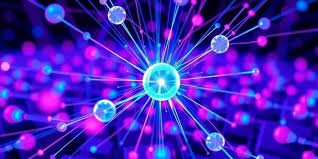"Scientists Unlock the Secrets of Quantum Entanglement in Groundbreaking Experiment"

Scientists Unlock the Secrets of Quantum Entanglement in Groundbreaking Experiment
In a revolutionary development for quantum physics, scientists have made significant progress in understanding the complex phenomenon of quantum entanglement. In a groundbreaking experiment, researchers have unlocked new insights into this puzzling and highly elusive aspect of quantum mechanics, potentially paving the way for advancements in quantum computing, secure communications, and our understanding of the fundamental nature of reality itself.
Quantum entanglement is a phenomenon in which two or more particles become interconnected in such a way that their properties are linked, even when separated by vast distances. This means that a change in one particle’s state instantly affects the other, regardless of the distance between them. Albert Einstein famously referred to this as "spooky action at a distance," as it seemed to defy the laws of classical physics. However, over the past few decades, experiments have consistently confirmed the existence of quantum entanglement, and its potential applications are now at the forefront of scientific research.
In the latest experiment, conducted by a team of physicists at a leading research institution, scientists were able to manipulate and control entangled particles with an unprecedented level of precision. The team employed a highly sophisticated setup using photons—particles of light—that were entangled and then separated across a considerable distance. By measuring the polarization of the photons, the researchers were able to demonstrate how the entangled particles remained connected even after traveling through different environments and at distances that would typically be impossible for classical communication to maintain.
The breakthrough comes from a new technique that allows scientists to "untangle" or "decouple" the entanglement without losing its integrity. Previously, maintaining the entanglement of particles over long distances was a major challenge, as interference from the environment often caused the entangled particles to lose their quantum connection. The researchers developed a new method to shield the entangled particles from environmental noise, preserving the delicate quantum state over longer periods and larger distances. This advancement opens up possibilities for more practical applications of quantum entanglement, particularly in the fields of quantum cryptography and quantum computing.
One of the most exciting applications of quantum entanglement is in the development of quantum computers. Unlike classical computers, which use bits to represent data as either 0 or 1, quantum computers use quantum bits, or qubits, which can exist in multiple states simultaneously, thanks to superposition. Entanglement further enhances the power of quantum computers by allowing qubits to be linked, enabling them to process vast amounts of information in parallel. The recent experiment’s success in controlling entanglement more effectively could significantly accelerate the development of practical quantum computers.
Another promising application of quantum entanglement lies in quantum cryptography. Quantum entanglement allows for the possibility of "unbreakable" encryption methods. In quantum key distribution (QKD), for example, the encryption key used for secure communication is encoded in the quantum state of entangled particles. Any attempt to intercept or eavesdrop on the transmission would disturb the quantum state and alert the parties involved, making it virtually impossible for malicious actors to gain access to the information without detection.